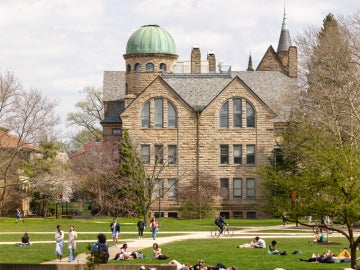Bringing Black Spirituals to the Masses
February 7, 2018
Amanda Nagy

DaQuan Williams is an aspiring choral director.
Photo credit: Courtesy of DaQuan Williams
DaQuan Williams ’20 works to promote education of African American spirituals and the works of musicians of color.
In high school and community youth choirs in Chicago, DaQuan Williams regularly performed spirituals and gospel music arranged by renowned conductor Moses Hogan. When he came to Oberlin, however, he didn’t immediately make the connection that Hogan, an accomplished concert pianist and choral director, was a 1979 graduate of the Conservatory of Music.
It wasn’t until his second semester, when Williams was having conversations with students majoring in vocal performance, that he discovered Hogan’s relationship to Oberlin. The revelation led him to think more deeply about Oberlin’s institutional history with the genres of African American spirituals and black classical music.
“I began to ask, ‘If I’m just now discovering Hogan’s ties to Oberlin after a full semester of study, what else haven’t I learned?” Williams says. He found that Oberlin’s history with black spirituals runs deeper than Moses Hogan: Musicians such as R. Nathaniel Dett, Revella E. Hughes, and Francois Clemmons trained at Oberlin and went on to become pioneers in the genre.
“I think it would be great to further educate the campus community about black choral music,” says Williams, a second-year majoring in anthropology and musical studies. “Whether this takes the form of an entire course, a couple of featured lectures, or some fun interactive programs, we need to implement more ways of interacting with this content.”
To that end, Williams has organized a Moses Hogan Sing-Along in celebration of Black History Month. The event, which will take place Thursday, February 22 in Warner Concert Hall, welcomes anyone who enjoys singing to rehearse some of Hogan’s most famous spiritual arrangements in hopes of learning more about his art.

“It also aims to give aspiring choral conductors like me the opportunity to get hands-on experience leading an ensemble of singers,” says Williams.
Williams led a similar event during last year’s Black History Month programming, but this year he has devoted more time to planning and researching. For this winter term experience, he visited historically black colleges and universities (HBCUs) that have played an integral role in the instruction and production of prominent black musicians. These include Fisk University, Kentucky State University, Morehouse College, and Spelman College, all located near Atlanta.
“I have learned so much about the culture and musical history of these HBCUs. These institutions are the reason why African American spirituals are as widely disseminated and venerated as they are today.”
Despite Oberlin’s legacy and impact on black choral music, Williams is among a vocal group on campus who have expressed a need for more education and inclusion of music from non-western cultures. He says he has engaged with Conservatory Associate Dean for Academic Support Chris Jenkins and conservatory faculty members Fredara Hadley and Charles McGuire to address the issue head-on.
Jenkins and Hadley are holding open lectures centered around African American classical music and the black history of the conservatory during Black History Month. See the full Black History Month schedule.
You may also like…
Oberlin Launches Critical AI Studies Minor in Fall 2026
With a solid foundation in both science and the humanities, this minor ensures students to understand and be able to analyze the ethical, cultural, environmental, political, economic, technological, and labor effects of AI.
Research Roundup
Every day, Oberlin’s faculty and students produce scholarly work that uncovers new insights into how we understand the world, particularly in the areas of sustainability and the environment.
Oberlin College & Conservatory Celebrates Black History Month
Throughout February 2024 (and a little into March), Oberlin commemorated Black History Month around the theme Ode to Home.


